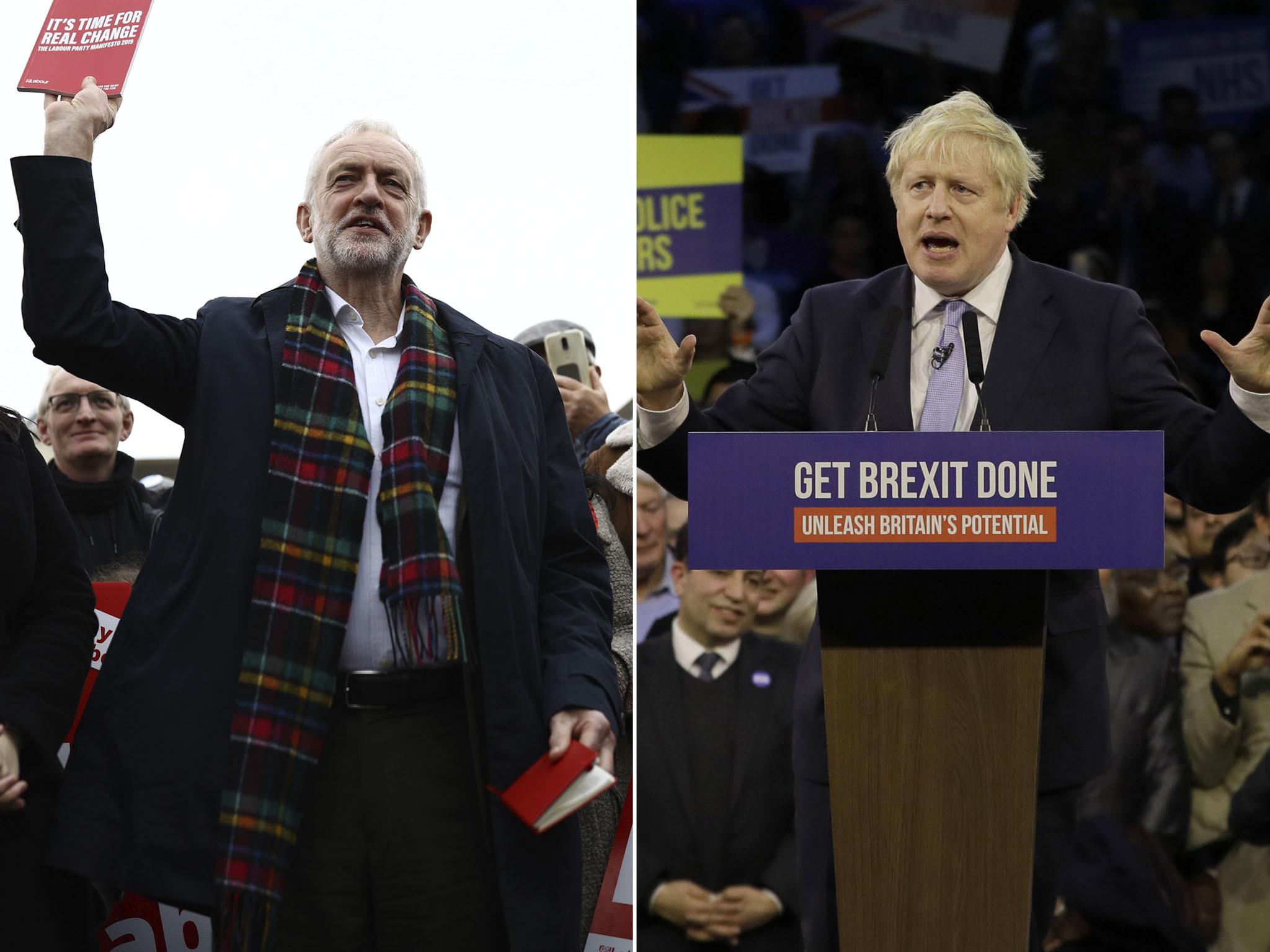Where the general election campaign was won and lost
Andrew Grice weighs up where it went right for the Tories – and where Labour went wrong


How was the election won and lost? The history books will call it a “Brexit election” that remade the UK’s political map, and say it was a personal triumph for Boris Johnson. But it was also a verdict on Jeremy Corbyn’s four years as Labour leader – and a much less flattering final one than his unexpected success in depriving Theresa May of her majority in 2017.
With Labour lurching left and Mr Johnson apparently wooing the Eurosceptic right, the contest offered a huge opportunity to the Liberal Democrats to come through the middle. Jo Swinson allowed Mr Johnson the election he wanted. But her policy of revoking Article 50 was seen as extreme. A split in the Remain vote between Labour and the Lib Dems helped the Tories, while antipathy between the two opposition parties did not encourage anti-Tory tactical voting.
In this campaign, there was not a single turning point, but here are 10 of the most important factors:
Tory plus points
Brexit Party retreat: Nigel Farage’s decision to withdraw his Brexit Party candidates in the 317 seats won by the Conservatives at the 2017 election. This largely united the Leave vote behind the Tories, while the Remain camp remained divided. In effect, Mr Farage told Leavers they could trust Mr Johnson.
Vote Boris: Mr Johnson did not have a faultless campaign, as shown by his mishandling of the four-year-old boy who laid on the floor at Leeds General Infirmary. But he succeeded in his primary goal of winning over traditional Labour voters in the north and midlands. Many had never voted Tory before, but were prepared to “back Boris” on Brexit.
Message discipline: The Tories had the most powerful slogan of the campaign in “get Brexit done” and stuck to it. They learnt a lesson from Theresa May’s chaotic campaign in 2017, by having a single chain of command. Mr Johnson dominated the campaign to keep the focus on Brexit. Most of his cabinet were dubbed “the disappeared”.
A safety-first manifesto: The Tories were scarred by the way Theresa May’s radical manifesto in 2017 backfired, forcing her to abandon the so-called “dementia tax”. This time the party put social care in the “too difficult box”. It gave no hostages to fortune, and said very little about the direction of the Johnson government over the next five years.
Donald Trump: His three-day visit to London for a Nato summit had given Team Boris sleepless nights because the unpredictable US president would not be under their control. He got the memo: intervening in the election would be counterproductive. For once, he was on his best behaviour, declining to fuel Labour claims that a US-UK trade deal would harm the NHS.
Labour minus points
Jeremy Corbyn: In a leaked recording of a phone conversation, Jonathan Ashworth, the shadow health secretary, told a Tory “friend” that “the combination of Corbyn and Brexit” outside the cities was “abysmal” and Labour’s prospects “dire”. Mr Ashworth insisted he was joshing, but his criticism of Mr Corbyn was voiced in public by several Labour figures as soon as the results came in. The Labour leader was much less popular than he was in 2017. The timing of the Ashworth leak was devastating, diverting attention from Mr Johnson’s lack of empathy over the treatment of the boy on the hospital floor.
Brexit: Labour tried to focus on the NHS and Tory austerity, but could not escape the shadow of Brexit. The party tried to appeal to both Remainers and Leavers in order to unite the country, but lost the backing of many traditional working class supporters in the north and midlands. The party’s policy – a Final Say referendum with a choice between a soft Brexit and Remain – was difficult to explain. Mr Corbyn was accused of weak leadership after announcing he would stay neutral during the referendum.
The manifesto: Although many of Labour’s policies were popular, its manifesto was seen as “too good to be true”. The party doubled down on its radical 2017 blueprint, with an even bigger hike in public spending and lots of “free stuff”. But many voters doubted it could be delivered. Labour, which stuck to a carefully costed programme in 2017, lost some credibility by announcing £58bn of compensation for the “Waspi women” a few days after its manifesto launch.
Antisemitism: Ephraim Mirvis, the chief rabbi, said antisemitism in the Labour Party had been “sanctioned from the very top”, making Mr Corbyn unfit for high office. The Labour leader stubbornly declined to apologise for the party’s response to the problem during an uncomfortable interview with the BBC’s Andrew Neil. He finally apologised a week later in an ITV interview. Even some Corbyn loyalists believe he should have said sorry more quickly.
The Queen: Mr Corbyn suggested he did not watch the Queen’s Christmas Day broadcast to the nation. He was evasive in an ITV interview, saying “we usually have it on”, but said her 3pm message was televised “in the morning”. Although Labour played down the gaffe, some candidates admitted privately that it damaged the party leader. Like Mr Johnson, Mr Corbyn also had a trust problem.
Join our commenting forum
Join thought-provoking conversations, follow other Independent readers and see their replies
Comments
Bookmark popover
Removed from bookmarks